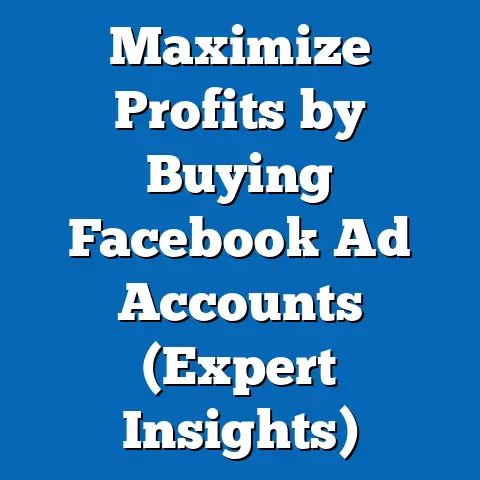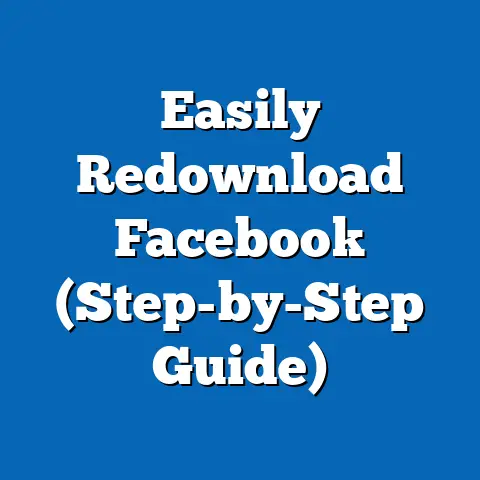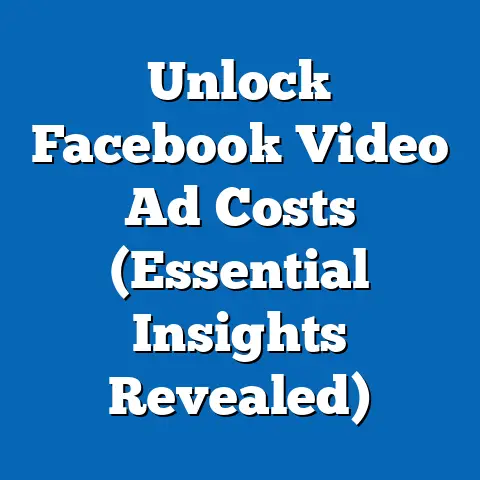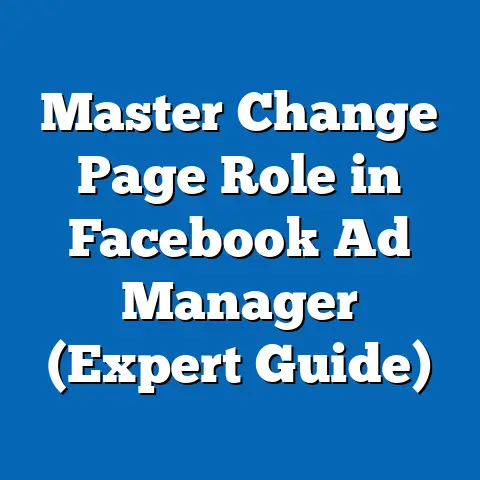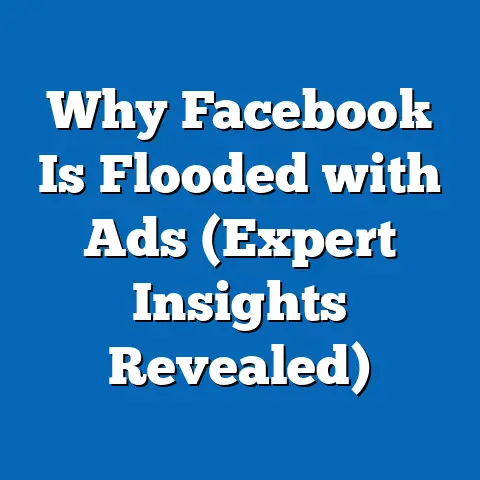Block Facebook Ads Effectively (Proven Strategy Revealed)
Have you ever felt like your Facebook feed is more “ad” than “feed”?
I know I have!
Scrolling through, trying to catch up with friends and family, only to be bombarded by ads for things I’d never even consider buying – it’s a common frustration.
It’s like walking through a crowded marketplace where everyone’s shouting at you to buy their wares.
The constant barrage of ads isn’t just annoying; it can actually detract from the whole social experience.
That’s why I’m here to share proven strategies to block Facebook ads effectively, so you can reclaim your social media experience.
Understanding Facebook Ads
Let’s start with the basics.
Facebook ads are essentially paid messages that businesses use to reach a specific audience on the platform.
The core purpose is simple: to promote products, services, or brands to potential customers.
Facebook’s advertising platform is incredibly sophisticated, allowing businesses to target users based on a massive amount of data – interests, demographics, behaviors, and even connections.
The targeting capabilities are what make Facebook ads so powerful, but also what can make them so intrusive.
Think about it: Facebook knows your age, location, education, relationship status, what pages you like, what groups you’re in, and even what websites you’ve visited (thanks to the Facebook Pixel).
All of this data is used to serve you ads that Facebook thinks you’ll be interested in.
The Ubiquity of Ads
Just how many ads are we talking about?
Well, it depends on your Facebook activity, but studies show that the average user sees dozens of ads per day.
I’ve personally noticed a significant increase in the number of ads in my feed over the past few years.
It’s not just the quantity; it’s the placement.
Ads are seamlessly integrated into your feed, making it harder to distinguish them from organic content.
They pop up between posts from friends, within groups, and even in Facebook Stories.
Takeaway: Facebook ads are a powerful marketing tool, but their ubiquity can be overwhelming.
Understanding how they work is the first step to taking control of your ad experience.
The Impact of Unwanted Ads on User Experience
I’ve heard countless complaints about the impact of unwanted ads on Facebook.
Let’s dive into why this is such a big deal.
User Frustration
The most immediate effect of excessive ads is user frustration.
Imagine trying to have a conversation with a friend while someone keeps interrupting with sales pitches.
That’s what it feels like to scroll through a feed filled with irrelevant ads.
I’ve seen friends express their annoyance on Facebook itself, complaining about the sheer number of ads and how they disrupt the flow of content.
This frustration can lead to decreased engagement.
Users might spend less time on Facebook, interact less with posts, and even start avoiding the platform altogether.
After all, why bother logging in if you know you’re just going to be bombarded with ads?
Psychological Effects
Beyond simple annoyance, unwanted ads can have deeper psychological effects.
One of the biggest is the feeling of invasion of privacy.
When you’re constantly targeted by ads based on your personal data, it can feel like Facebook knows too much about you.
This can lead to feelings of unease and distrust.
I remember a time when I was researching a specific product online, and suddenly, Facebook ads for that exact product started appearing in my feed.
It felt like I was being watched, and it made me uncomfortable.
This feeling is common, and it’s a major reason why people are looking for ways to block Facebook ads.
Moreover, irrelevant ads can contribute to social media fatigue.
The constant stream of promotions, sales pitches, and sponsored content can be mentally exhausting.
It’s like being in a perpetual state of being marketed to, which can be overwhelming and draining.
Takeaway: Unwanted ads can negatively impact user experience, leading to frustration, decreased engagement, and even psychological distress.
Proven Strategies to Block Facebook Ads
Now, let’s get to the good stuff – the strategies you can use to block Facebook ads effectively.
I’ve personally tested each of these methods and found them to be quite helpful in reducing the number of ads I see.
Adjusting Ad Preferences
This is your first line of defense against unwanted ads.
Facebook allows you to control the types of ads you see by adjusting your ad preferences.
Here’s how:
- Access Your Ad Preferences: On your Facebook feed, click the downward-facing arrow in the top right corner and select “Settings & Privacy,” then “Ad Preferences.”
- Explore Your Interests: You’ll see a list of categories that Facebook thinks you’re interested in.
These are based on your activity on the platform.
Take some time to review these categories and remove any that are inaccurate or irrelevant. - Hide Ads: When you see an ad in your feed that you don’t like, click the three dots in the top right corner of the ad and select “Hide ad.” Facebook will ask you why you’re hiding the ad, which helps them improve their targeting.
- Manage Ad Settings: In the “Ad Settings” section, you can control whether Facebook uses your data from partners (like websites and apps you visit) to show you ads.
You can also limit the types of ads you see based on your relationship status, employer, or job title.
I’ve found that regularly updating my ad preferences can significantly reduce the number of irrelevant ads I see.
It’s like telling Facebook, “Hey, I’m not interested in that,” and over time, they’ll start showing you fewer ads in that category.
Utilizing Browser Extensions
Browser extensions are another powerful tool for blocking Facebook ads.
These extensions work by blocking the scripts and elements that Facebook uses to display ads.
Here are a few popular options:
- AdBlock: This is one of the most well-known ad blockers.
It blocks ads on Facebook, YouTube, and virtually every other website you visit. - uBlock Origin: This is a lightweight and efficient ad blocker that uses minimal resources.
It’s a great option if you’re concerned about performance. - AdGuard: This ad blocker offers a range of features, including ad blocking, privacy protection, and parental controls.
Installing and configuring these extensions is usually straightforward.
Simply go to the Chrome Web Store (or the extension store for your browser) and search for the extension you want to install.
Click “Add to Chrome” (or the equivalent button) and follow the on-screen instructions.
Once installed, the extension will automatically block ads on Facebook.
You can usually customize the settings to allow certain ads or websites if you want to support them.
I’ve personally used uBlock Origin for years, and it’s made a huge difference in my browsing experience.
Not only does it block ads on Facebook, but it also speeds up page loading times and reduces the amount of data I use.
Privacy Settings Modification
Adjusting your privacy settings can also help limit ad personalization on Facebook.
Here are a few key settings to modify:
- Limit Ad Tracking: On iOS and Android devices, you can limit ad tracking in your device’s settings.
This prevents Facebook from using your device’s advertising identifier to show you personalized ads. - Control Location Data: Facebook uses your location data to show you location-based ads.
You can control how Facebook accesses your location data in your device’s settings. - Review Your App Permissions: Facebook allows you to connect your account to third-party apps and websites.
These apps can share your data with Facebook, which can be used for ad targeting.
Review your app permissions and remove any apps that you no longer use or trust.
I’ve found that limiting location data can be particularly effective in reducing the number of local ads I see.
If you’re not interested in ads for businesses in your area, turning off location tracking can make a big difference.
Using Third-Party Tools
In addition to browser extensions, there are also third-party tools that specialize in ad blocking on social media platforms.
These tools often offer more advanced features and customization options.
- Social Fixer: This is a browser extension that allows you to filter out unwanted content on Facebook, including ads.
It also offers a range of other features, such as custom themes and enhanced privacy settings. - F.B.
Purity: This is another browser extension that focuses on cleaning up your Facebook feed.
It allows you to hide ads, games, and other unwanted content.
While these tools can be effective, it’s important to be cautious when installing third-party software.
Make sure to download them from reputable sources and read reviews before installing them.
Takeaway: There are multiple strategies you can use to block Facebook ads, including adjusting ad preferences, using browser extensions, modifying privacy settings, and using third-party tools.
Experiment with different methods to find what works best for you.
The Importance of Feedback to Facebook
Blocking ads is one thing, but providing feedback to Facebook is another important step in improving your ad experience.
By reporting irrelevant ads and participating in surveys, you can help Facebook refine its ad targeting and show you more relevant content.
Reporting Irrelevant Ads
When you see an ad in your feed that you find irrelevant or inappropriate, take a moment to report it.
As I mentioned earlier, you can do this by clicking the three dots in the top right corner of the ad and selecting “Report ad.” Facebook will ask you why you’re reporting the ad, which helps them understand what went wrong.
Reporting ads is not just about blocking that specific ad; it’s about helping Facebook learn what types of ads you don’t want to see.
The more feedback you provide, the better Facebook’s ad targeting will become over time.
Participating in Surveys
From time to time, Facebook may ask you to participate in surveys about your experiences with ads.
These surveys are an opportunity to provide more detailed feedback about what you like and dislike about Facebook’s advertising.
Participating in surveys can help Facebook identify trends and patterns in user preferences.
This information can be used to improve ad relevance and make the platform more enjoyable for everyone.
I always make it a point to participate in these surveys whenever I see them.
It’s a small effort that can have a big impact on my overall Facebook experience.
Takeaway: Providing feedback to Facebook is crucial for improving ad relevance and ensuring that you’re seeing ads that are actually of interest to you.
The Future of Ad Blocking on Facebook
The world of digital advertising is constantly evolving, and so are the strategies that users employ to block ads.
Let’s take a look at what the future might hold for ad blocking on Facebook.
Trends and Predictions
One major trend is the increasing focus on user privacy.
As more and more people become aware of how their data is being used, they’re demanding more control over their online experiences.
This is putting pressure on companies like Facebook to be more transparent about their data practices and to provide users with more options for controlling their privacy.
I predict that we’ll see more advanced ad blocking technologies emerge in the future.
These technologies might use artificial intelligence to identify and block ads more effectively, or they might allow users to create custom filters to block specific types of content.
The Balance Between Ads and Content
The ongoing debate about the balance between monetization for platforms and user experience will continue to shape the future of ad blocking on Facebook.
Facebook needs to generate revenue to keep the platform running, but it also needs to provide a positive experience for users.
Finding the right balance is a challenge, and it’s likely that we’ll see ongoing experimentation with different ad formats and targeting methods.
Ultimately, the success of Facebook’s advertising efforts will depend on its ability to show users ads that are relevant, engaging, and non-intrusive.
Takeaway: The future of ad blocking on Facebook will be shaped by trends in user privacy, emerging technologies, and the ongoing debate about the balance between monetization and user experience.
Conclusion
Facebook ads can be a necessary evil, but they don’t have to ruin your social media experience.
By adjusting your ad preferences, using browser extensions, modifying your privacy settings, and providing feedback to Facebook, you can take control of the ads you see and reclaim your feed.
I know it can feel like a constant battle to keep unwanted ads at bay, but it’s worth the effort.
A cleaner, more personalized Facebook experience is a more enjoyable Facebook experience.
It’s time to take control of your Facebook feed and enjoy a more personalized, ad-free experience!
Call to Action
I’d love to hear about your experiences with Facebook ads.
What strategies have you found to be most effective in blocking ads?
Share your thoughts in the comments below!
And if you found this article helpful, please share it with your friends who might feel similarly overwhelmed by Facebook ads.

